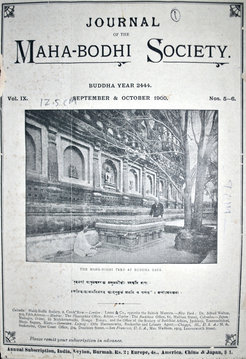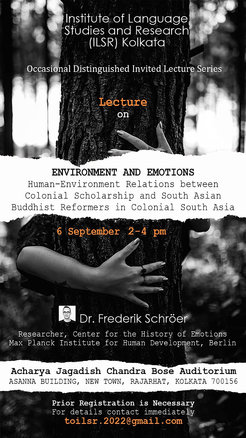Environment and Emotions: Human-Environment Relations Between Colonial Scholarship and South Asian Buddhist Reformers in Colonial South Asia
Frederik Schröer
This project focuses on the role of emotions in human relations to environments and to nonhuman actors. To better face the current climate crisis in the Anthropocene, we need to reassess the Age of High Imperialism as a crucial ecological and historical watershed. It was in this period that human influence first precipitated systemic ecological change, and that local/traditional ways of relating to (natural) environments first interacted with colonial science and modernity. What emotions did environments and their changes and crises elicit? What emotional grammars were drawn on to make sense of ecological change and crisis? And how did nonhuman actors participate in these ecologies of feeling?
The project concentrates on Buddhists and scholars of Buddhism in colonial South Asia, across the colonizer–colonized spectrum, tracing their relation to natural (sacred trees, forests, mountains) and archaeological environments, as well as to those in canonical texts, and to those in crisis (famine). This regional focus, grounded in multiple South Asian languages, is expanded through a global perspective following intellectual networks to both Europe and East Asia. Alongside its intervention in colonial and environmental history, the project also rethinks the study of emotions themselves. By bringing Buddhist epistemologies into dialogue with posthumanism, new materialism, and new insights in (environmental) neuroscience, it locates emotions as critical aspects of a non-Eurocentric model of worlded cognition, challenging anthropocentrism.
The project’s initial phase, launched in 2021, focused on its theoretical and methodological design. 2022 saw the systematic gathering of primary sources (monographs, periodicals, visual material, government reports, and other documents) in European and Indian archives, and their analysis using qualitative data analysis software. First public outreach was also undertaken, including workshop participation and public talks in Europe and South Asia, as well as graduate-level teaching at Freie Universität Berlin. As of 2023, the project has moved on to the publication of first findings with one article, “Affective Entanglements: Human-Nonhuman Relations in Buddhist Ecologies of Feeling,” under review at the Journal of Global Buddhism and two more in submission. For the continuation of archival work in 2023, the project was awarded the Gerald D. Feldman travel grant by the Max Weber Foundation, enabling research in both India and the UK.



